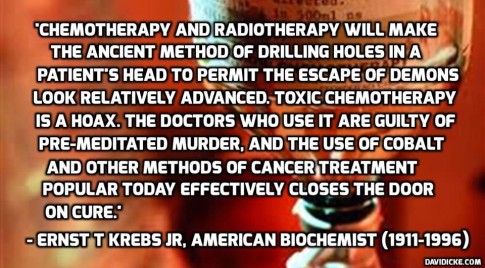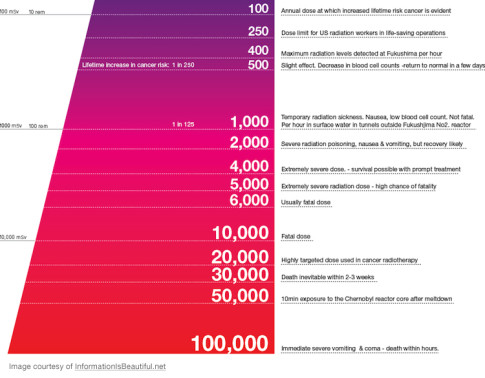(Click on image to enlarge.)
– Radiation exposure chart admits cancer radiotherapy delivers fatal dose to patients:
Thanks to the Fukushima catastrophe, we’ve all been learning a lot about the laws of physics lately — especially about radiation. To help explain it all, the folks over at InformationIsBeautiful.com have created a radiation explanation chart that shows the relative levels of harm from various doses of radiation (link below).
The InformationIsBeautiful website is pretty cool. The folks there specialize in making complex data visually interesting. I’ve admired some of their work for quite some time.
So I was checking out their new “Radiation Dosage Chart” which explained all the effects of receiving radiation doses of various levels. The chart revealed things like:
• 100 mSv Annual dose at which increased lifetime cancer risk if evident
• 250 mSv Dose limit for US radiation workers in life-saving operations
• 1,000 mSv Temporary radiation sickness. Nausea, low blood count. Not fatal.… and so on.
As I read down the chart, things got really interesting. View the chart yourself here:
http://www.naturalnews.com/images/radiation-…• 2,000 mSv Severe radiation poisoning
• 4,000 mSv Extremely severe dose – survival possible
• 5,000 mSv Extremely severe radiation dose – high chance of fatality
• 6,000 mSv Usually fatal dose
• 10,000 mSv Fatal doseAnd then, right there on the chart, the very next line was a huge eye-opener, because it said:
• 20,000 mSv Highly targeted dose used in cancer radiotherapy
Cancer radiotherapy dose is fatal?
Okay, so wait a minute. A dose of 10,000 is fatal, yet the cancer industry uses twice that dose to “treat” cancer? I knew cancer radiation treatments were barbaric, but I never knew they were twice the amount considered absolutely fatal.
This outcome was so intriguing that I took a screen capture of the chart. That’s what you’re seeing at: http://www.naturalnews.com/images/radiation-…
The next day, I went back to the InformationIsBeautiful.net website to make sure I really saw what I thought I saw. After all, if cancer radiotherapy is being given at 20,000 mSv, that’s a pretty big story, especially in light of the Fukushima fallout and the increasing radiation burden on populations everywhere. So I brought up the website, and guess what?
The 20,000 mSv cancer radiotherapy line had been removed from the chart.
You can now see this for yourself at the InformationIsBeautiful website:
http://www.informationisbeautiful.net/visual…Notice anything missing? The 20,000 mSv line has been removed. It now jumps from 10,000 to 30,000.
Jokingly stated, it seems that the Information Is Beautiful website might now appear to be the Information Is Missing website.
Cancer industry influence?
So how do you think this line about 20,000 mSv in cancer radiotherapy got removed? I suppose there are a number of possible explanations for it. One particularly conspiratorial explanation is that someone from the cancer industry probably asked them to remove it. The cancer industry, after all, doesn’t want people knowing the simple truth that cancer radiotherapy involves a fatal dose of radiation. And no industry operates with more secrecy than the cancer industry, it seems, with all its cover-ups about the dangers of chemotherapy and its continued suppression of the truth about vitamin D and its cancer preventive effects.
Then again, the InformationIsBeautiful website has actually done a fantastic job of producing information about Vitamin D and sunlight exposure. This is precisely the kind of information the cancer industry doesn’t want people to see: http://www.informationisbeautiful.net/2010/v…
(Pretty cool chart, eh?)
Just to give these folks a chance to explain all this, I sent off an email to David at the InformationIsBeautiful website asking them to clarify why they pulled the cancer radiotherapy information off their radiation dosage chart. Perhaps there’s a completely innocent explanation for it, I thought, and I want to know the real story here.
The email I received in return was a polite response with a collection of frequently asked questions and answers. I don’t blame the guys there for using this — they’re probably incredibly busy these days — but I was intrigued by one of the answers in the email itself: It said that the InformationIsBeautiful team has “done commercial work for GE, the BBC, Google and many others.”
And who is GE? They are, of course, one of the world’s top manufacturers of radiotherapy equipment!
You can see an example of their radiotherapy machines at http://radiologynews.gehealthcare.com/en/com…
So now we have the Information Is Beautiful team pulling the “cancer radiotherapy” line out of their chart, then admitting they are a paid client of General Electric, a top manufacturer of radiotherapy equipment.
None of this proves anything, of course, but it probably raises a few eyebrows. Is there a financial conflict of interest at work here? Personally, I like their website a lot, and I’m a fan of their charts. So I don’t want to think they might be engaged in some sort of intentional censoring of their chart data just to protect the cancer industry. But I’ve seen stranger stuff happen, for sure…
Is this a case of blatant information distortion?
The Information Is Beautiful website, by the way, isn’t necessarily known for censoring their information due to political pressure. They do seem to be good guys in plenty of ways. For example, they say they’re donating the proceeds from the sales of their radiation dosage chart to help with Japan relief efforts, and that’s admirable. They also produce a lot of other really useful charts that have been very popular across the ‘net.
Then again, the cancer industry can be very, very threatening to those who don’t submit to its suppression of information both on the web and across the mainstream media.
Now, the trolls and paid online muckrakers hired by Big Pharma will of course insist that I’m making all this up. They’ll say the chart never had the 20,000 line in it. I must have Photoshopped my screenshot to put it there, they’ll charge. These people never stop lying in their attempts to smear those who are working each day to expose the deceptions of the pharmaceutical industry, of course. (They are actually paid by Big Pharma to poison the ‘net.)
Fortunately for me, there is yet another source of evidence that backs up my story. A thread over at Gizmodo.com contains the exact same original radiation dosage chart that captured as a screen shot. It shows quite clearly the original 20,000 mSv line.
You can see that page at http://gizmodo.com/#!5786933/the-most-colorf…
I am taking a screen shot of that page, too, just in case it magically disappears. If you go there and don’t see the chart, rest assured that’s exactly what happened (I’ve seen this happen hundreds of times with sensitive topics).
The chart image on that page links to an archived image on Gawkerassets.com which contains the full chart: http://cache.gawkerassets.com/assets/images/…
And there, for all the world to see, is the full chart, with the 20,000 mSv “cancer radiotherapy” line, credited to David McCandless, March 2010, InformationIsBeautiful.net
Now, just in case that image also gets squelched off the ‘net, I have saved a copy of it as well. (You might want to save off your own copy just in case.)
Version 1.35 has less information than version 1.0
Interestingly, if you go back to the version of the chart on the InformationIsBeautiful website, you’ll notice that it currently says version 1.35 along the bottom (http://www.informationisbeautiful.net/visual…).
What’s really interesting is that if you compare the Version 1.0 and Version 1.35 charts, there are no significant differences other than the removal of the 20,000 mSv cancer radiotherapy line.
In other words, as this chart got “upgraded,” its content actually got pared down. And what exactly got cut from the chart? The line about cancer radiotherapy.
Again, I am not accusing the guys over at InformationIsBeautiful of outright censorship or anything. There might be an innocent explanation for all this. But I’ve seen before how knowledge gets selectively removed from the most visible information sources, keeping people in the dark about something that is quite literally killing them.
So we’ll see where this goes. I’m genuinely curious to see what their response is to this article. If they’re polite and have a reasonable explanation for this, I’ll do my best to pass it along. Heck, maybe they’ll even want NaturalNews to help promote some of their upcoming charts on health issues such as vitamin D. Their charts are, after all, uber cool.
What are the actual radiation doses used by the cancer industry?
In the mean time, you might be wondering about another possibility: Is it possible that the line was pulled from the chart because it was not accurate? Maybe it was a typo, and the cancer industry doesn’t even use that high of a dose.
Interestingly, a post beneath the chart on the Gizmodo thread, posted by user scarbrtj, says:
Chart says 20,000 mSv (20 Gy) is a “highly targeted dose used in cancer radiotherapy.” Not really. That (very low) dose is almost never used for any cancer. For example, a dose of 80,000 mSv (80 Gy) is used for prostate cancer (and incidentally side effects are minimal to zero long-term because the radiation is so targeted in this case)… 60,000 mSv for breast cancer… 70,000 mSv for lung cancer… 50,000 mSv for rectal cancer.
Not that random internet posters have instant credibility or anything, but here we have a user explaining that far higher doses are routinely used in other cancer treatments.
Just to double check my facts here, I went looking for more information on the actual radiation doses used in cancer treatments. It turns out that 20,000 mSv (roughly 20 Gy) is on the low end. Epithelial tumors, for example are routinely treated with 60 to 80 Gy! Source: Wikipedia (http://en.wikipedia.org/wiki/Radiation_thera…)
Even more interestingly, doses of 45 – 60 Gy (roughly 45,000 – 60,000 mSv, see notes below) are used as a cancer prevention dose in breast cancer and cancers of the head and neck.
The radiotherapy scam exposed — again!
Just in case you’re not following all this, what we’re seeing here is that 10,000 mSv is a fatal dose. The 20,000 mSv line was removed from the chart between versions 1.0 and 1.35. Meanwhile, the cancer industry is routinely using 60,000 mSv focused on the head and neck as a way to “prevent” cancer!
Are you starting to see how huge this cancer radiotherapy scam really is? Think about it: If exposure to just 100 mSv can actually cause cancer, then how can exposure to 60,000 mSv somehow “cure” it?
Not surprisingly, the cancer industry’s lies fall apart when you look at the science. No wonder the industry has to work so hard to keep people misinformed. If cancer patients knew they were receiving literally 60,000% higher radiation doses (that’s 60,000 mSv versus 100 mSv) than the level necessary to significantly increase the risk of cancer, they probably wouldn’t sign up for more “treatments.”
For the record, mSv and Gy units (Grays) don’t always convert neatly and nicely back and forth, so these numbers are approximate, and they can vary based on the type of radiation and its so-called “biological damage conversion factor.” As explained on the RadProCalculator website (http://www.radprocalculator.com/FAQ.aspx):
Rad and Gray are absorbed dose units. When we look at radiation being absorbed in tissue, the absorption varies with the energy of the radiation. With a higher energy deposition in tissue, there are more rads or more Grays deposited than a lower energy deposition at the same rate (particles or photons per second). Now, what is a rem and what is a a Sievert? The term rem came from an acronym that means Roentgen Equivalent Man, in another words the equivalent biological damage done to human tissue. Some radiation emissions, when depositing the same energy as other radiation emissions, do more biological damage to the human organism than others. How does one convert? To go from rad to rem or from Gray to Sievert, you need a multiplication factor that represents the effective biological damage. Most training texts call this a quality factor (QF) or a radiation weighting factor. Some training texts call it a biological damage conversion factor but what it truly represents is the the ratio of biological damage done by radiation types to the biological damage done by gamma radiation. For gamma, x-ray and beta radiation, this factor is 1. For alpha, it is 20. For neutrons it is between 3 and 10, and is generally conservatively taken as 10. What this implies is that a rad or Gray of alpha energy absorbed by soft human tissue does 20 times more damage than a rad or Gray of gamma, x-ray or beta energy absorbed. Since for gamma, x-ray and beta, the multiplication factor is 1, one rad equals one rem and one Gray equals one Sievert.
So the actual calculations of damage depend on what numbers you use for the QF (radiation weighting factor). But even if you’re off by 10 or 20 percent, the dosage of radiation being used in cancer radiotherapy is orders of magnitude higher than the dose needed to cause cancer in a very high percentage of those people who are exposed.
The cancer industry’s own treatments, it turns out, are its best source of repeat business.
This is also true with chemotherapy, because the No. 1 side effect of chemotherapy is — guess what? — cancer!
I’ll keep you posted on the response (if any) we receive regarding this issue.
* * *
PayPal: Donate in USD
PayPal: Donate in EUR
PayPal: Donate in GBP



